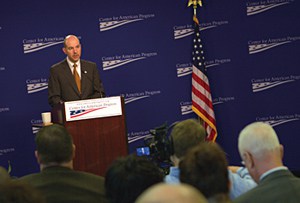In a blog piece in October we came to the defense of software patents. Software patents have been much maligned in the media in recent months, blamed for everything from being a tax on consumer products to a brake on innovation. Our conclusion was:
Yes, there may be some problems with software patents that are overly broad getting through the system. The answer is not to remove the incentive to innovate by disallowing all software patents. The answer is to make sure the USPTO only allows strong patents to get through. And if the occasional weak patent does get through, the court system is there to catch it.
In a recent speech to the Center for American Progress in Washington, DC, David Kappos, head of the US Patent and Trademark Office (USPTO) said more or less exactly the same thing. Kappos (who has announced he is stepping down from his post in January, 2013) said:
The right point of inquiry is quality. By getting that right, we grant patents only for great algorithmic ideas worthy of protection, and not for everything else. This administration and its innovation agency understand that low-quality patents do no good for anyone. Low quality patents lead to disputes, uncertainty, and lost opportunity. Quality is central to our mission. All of this especially for software.
The full text of Kappos’s speech, “An Examination of Software Patents,” can be found here, and if you are interested in software patents and have the time it’s a worthwhile read. For those who prefer the “executive summary,” his key points were as follows:
- Intellectual property drives economic growth, exports and job creation.
- Critics of software patents – who say they are mostly no good – are not backed up with facts. A study of smartphone software patents that went to litigation found that courts upheld 80% of them. This shows that software patents do not have an unusually high rate of “bad” patents indicating a broken system.
- Innovation today relies on both hardware and software. It makes no sense to say that innovation implemented in hardware deserves protection but innovation implemented in software does not. Kappos didn’t mention it in his talk, but it’s also the case that many innovations can be implemented in either hardware or software – it also makes no sense to force inventors to choose a hardware implementation to get a patent.
- The current software “patent war” is nothing new. The first patent war broke out in the mid-1800s, and it was over sewing machines. Similar patent wars have broken out with the telegraph, electricity, and airplanes. The wars are usually resolved by the major players getting together in licensing, cross-licensing, and joint development.
- There is room for improvement on software patents, and the USPTO has been hard at work. Improved guidelines for determining which claims are eligible for protection and guidelines for reviewing claim clarity have been issued. Examiners are being given more time to work on software patents and have been provided extensive training.
- Recent court rulings have narrowed what’s considered patentable.
- The America Invents Act contains several innovations, including third party submission of prior art and post grant review that have not been given a chance yet as they only recently came into effect.
- Further legislative and regulatory adjustments are in the works.
- The explosion of patents – and related litigation – in consumer electronics shows the system is working well and “wires us for innovation.”
Kappos’ tenure as USPTO-head has been almost universally praised in the IP world. We hope President Obama finds an equally astute and committed person to replace him.


